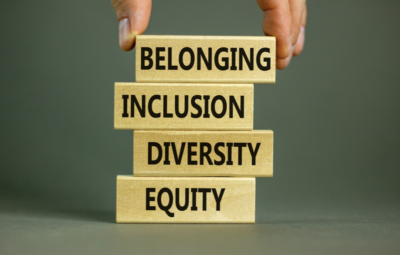
What Is a DEI Degree?
November 21st, 2024
What is a DEI Degree?
Professionals well-versed in diversity, equity, and inclusion (DEI) are in demand across various sectors. Having a graduate degree provides a solid foundation to make structural changes from within. Many employers associate a master’s degree with higher knowledge, experience, and leadership skills. Individuals who are interested in developing the leadership skills to advance their careers should consider the benefits of earning a master’s degree in DEI.
Understanding Diversity, Equity, and Inclusion
It’s important to understand the basic ideas that make up a master’s degree program in DEI. When we talk about diversity, we mean that a broad spectrum of identities, viewpoints, and experiences are present. This includes those based on:
- Race
- Ethnicity
- Gender
- Sexual orientation
- Age
- Religion
- Socioeconomic status
- Abilities
Different people require various forms of support to thrive. Equity focuses on ensuring fairness and justice in access to opportunities and resources. Creating a culture of mutual respect and appreciation is essential for inclusion.
The key to fostering an inclusive environment and work culture involves making everyone feel valued and encouraged to share their ideas.
What Is a Master’s Degree in Diversity, Equity, and Inclusion?
A master’s degree in DEI is a graduate program that equips students with the skills they need to integrate DEI principles into their professional duties and lead inclusivity initiatives at organizations of all kinds. While administrators in every sector can benefit from earning this degree, it can also be beneficial for educators, researchers, and many other types of professionals.
To prepare students to take a socially conscious approach to their careers, master’s degree programs in DEI include classes focused on building theoretical understanding, practical know-how, and analytical skills — all of which are required to promote and manage DEI initiatives within organizations. Master’s degree programs in DEI often include classes on:
- Law and organizational policy
- Community-based research
- Change management
- Gender identity, sexual orientation, religion, nationality, race, and other identities
- Identity safety
- Social justice
- Leadership skills with a focus on inclusive and equitable practices
Additionally, to develop a comprehensive understanding of DEI, students may take classes on topics such as sociology, psychology, organizational behavior, law, and communication. This multidisciplinary approach to education is central to what a DEI degree program is and can help students create long-lasting social change at their own organizations and beyond.
Equity is the fair and appropriate distribution of the resources needed for each person to reach their full potential. All aspects of DEI must be implemented to achieve real, long-lasting change. This will enable organizations to fully use all their diverse talents.
Recognizing that everyone has different needs and committing to providing for those needs are both aspects of leading with equity. As more businesses see the benefits of DEI, the demand for DEI experts continues to grow.

Why Earn a DEI Degree?
For many people, their reason for earning degrees in DEI leadership is the same: to improve their communities, whether it is a school, a hospital, a neighborhood, or a nation. While that doesn’t necessarily require a degree, there are plenty of ways a degree can help students meet their professional goals while leveraging their talents to empower others.
Be Part of the Demand
The DEI movement is not a recent development in the United States. Rooted during the Civil Rights Movement and gaining momentum following the COVID-19 pandemic, DEI isn’t going anywhere, despite being hotly debated in both the public and the private spheres.
According to a 2023 survey of 2,600 business leaders conducted by business software firm Workday, 78% of leaders said DEI initiatives were actually more important now than they had been in the previous year. A total of 85% said they had budgets for DEI initiatives, up from 74% the previous year.
While many of the survey respondents said they prioritized DEI initiatives simply because they attracted diverse employees, about 40% said DEI initiatives actually fostered success and improved results.
As the Workday survey indicates, businesses can perform better, grow, and be more innovative and resilient when they have diverse teams. Inclusion is necessary to establish such teams. However, not all businesses have considered building a solid foundation using equity. A leader in DEI makes sure that talented individuals from various backgrounds are fully included.
Build Company Culture
Creating a healthy, compassionate, and inclusive work environment should be the bare minimum. This reiterates how much change is needed and how much work needs to be done. Companies need a DEI professional to support all facets of diversity in the workplace to strengthen company culture.
Lead Systemic Change
A DEI degree is as much about learning leadership skills as it is about learning DEI principles themselves. A master’s degree prepares individuals to take on leadership roles and direct initiatives that promote DEI. Students in a master’s degree program in DEI learn how to challenge biases, address structural barriers, and advocate for equitable representation and opportunities. Graduates will develop the knowledge and skills to design and implement strategies that create inclusive policies, practices, and programs.
Exemplify Empathy
DEI leadership would be lacking a huge crucial human element required for impactful change without empathy. Professionals must truly understand the struggles and injustices experienced by marginalized communities. Having empathy allows professionals to create efficient plans for promoting inclusivity and equity.
Empathy provides the groundwork to understand and relate to people with various backgrounds, experiences, and viewpoints. In a master’s degree program in DEI, students learn to listen with intent, validate the experiences of others, respond with kindness, and create a safe workspace, helping others to feel respected, heard, seen, and supported.
Benefits of a DEI Degree
A master’s degree program in DEI offers you a deeper understanding of the principles and practices to be the catalyst in addressing systemic differences. One significant aspect of the DEI field involves promoting a sense of belonging among employees and stakeholders. This entails recognizing and valuing individual differences, ensuring equitable opportunities, and fostering an environment in which employees feel respected and included.
Hireability
Earning a master’s degree in DEI can help candidates stand out to employers. To them, a master’s represents a candidate who can hit the ground running, take immediate leadership action, and guide best practices.
Career Opportunities
Social justice initiatives are in critical and urgent need in local, national, regional, and global communities. A master’s degree in DEI allows individuals to work in many careers. However, while professionals in every sector share the same general goals, DEI leadership principles can be applied in numerous unique, community-building ways.
Business
In the business sector, the most important factor is the overall success of the company. DEI experts implement and encourage diverse and inclusive workplaces to promote innovation, employee satisfaction, and gender diversity.
Education
Skills learned through a master’s degree program in DEI can empower instructors to support the needs of each student. Outside the classroom, leaders in education can implement inclusive school curricula and celebrate diversity.
Nonprofit and government
DEI experts in the fields of nonprofit and government initiate projects that advocate for marginalized groups. They help these groups get the resources they need while encouraging systemic change.
Corporations
DEI professionals can collaborate with human resources (HR) departments, executive teams, and employees to develop inclusive hiring practices and diversity training programs. They contribute to creating a workforce that reflects the diversity of the customer base and promotes a culture of belonging.
Research and policy
Ethical, thorough research of social justice issues is what DEI degrees and initiatives are built on. It’s vital in shaping social discourse and driving change. DEI graduates can promote equity and inclusion by examining inequity, evaluating policy impacts, and providing evidence-based recommendations.
Community-based organizations
To identify and address the unique needs and challenges faced by marginalized communities, community-based organizations (CBOs) rely on DEI professionals. These professionals can work directly with community members, design programs, and collaborate with local leaders to advocate for systemic change.
Why Choose the Master’s in DEI at NDNU?
While Notre Dame de Namur University launched its fully online Master of Arts in Diversity, Equity, and Inclusion Leadership (MA DEI Leadership) program in 2023, social justice has been at the core of the school’s identity and mission since its opening in 1851.
Backed by this long tradition of social justice, NDNU provides professional programs emphasizing community engagement. To further enrich this impactful experience, NDNU maintains small classroom sizes. While online MA DEI Leadership students certainly benefit from this educational philosophy, NDNU makes this program as impactful, accessible, and practical as possible in many other ways.
Learn at Your Pace
The MA DEI Leadership program is fully available online, featuring synchronous and asynchronous instruction. Designed with working professionals in mind, the online format allows you to balance your professional and personal commitments.
Enhance Your Skills
The MA DEI Leadership program offers a great chance to improve your leadership skills. This will allow you to have a positive effect on your community, contributing to more equitable and inclusive workplaces, schools, and communities. Upon graduation, you will be well-prepared to take on leadership roles in organizations and drive meaningful change.
Program Structure
The NDNU DEI program is structured to foster equity and social justice and provide a supportive and inclusive learning environment. This allows you a space to learn and share your experiences, challenges, and questions with your peers.
This versatile program trains effective, informed, and agile leaders who understand the complex terrain of inequality, bias, and social justice. Upon completion of the program, you will be able to lead organizational change and transformation.
Financial Aid
In addition to Cal Grants, TEACH Grants, and other government-sponsored financial aid programs, NDNU students are eligible for need-based scholarships and grants made possible by our generous donors. These resources help make the program accessible and affordable as you pursue your master’s degree.
Begin Your Higher Education Journey
The right master’s degree program in DEI can help you make a difference. With its convenient online format, multidisciplinary curriculum, and focus on community engagement, the MA DEI Leadership program at NDNU strives to be the right program for students everywhere.
The knowledge and skills acquired through the MA DEI Leadership program prepare you to lead and direct DEI initiatives in communities and organizations of all kinds. To find out more about admissions and what NDNU has to offer, reach out to our team today.
Sources:
Forbes, 10 Reasons Why DEI Is Important for Businesses and How It’s Evolving
Fortune, “As the DEI Debate Rages On, Research Keeps Pointing to the Business Benefits”
Indeed, DEI: What Is It and How Can Employers Build It in the Workplace?
Indeed, Diversity in the Workplace (With Downloadable Templates)
Workday, Workday DEI Landscape Report: Business Leaders Remain Committed in 2024
More From NDNU

Master of Arts vs. Master of Science: What’s the Difference?
November 22nd, 2024 A master’s degree is a higher education degree that you can pursue after graduating with your bachelor’s. Choosing the right graduate school

What is an MBA degree worth?
Read Time Estimate: 4 minutes July 19th, 2023 The pursuit of a Master of Business Administration (MBA) has long been considered a gateway to success

Is a Bachelor’s Degree Worth It? – Notre Dame de Namur University
Read Time Estimate: 3 minutes November 5th, 2023 In today’s fast-paced world, you may question the worth of getting a bachelor’s degree. People have emphasized
